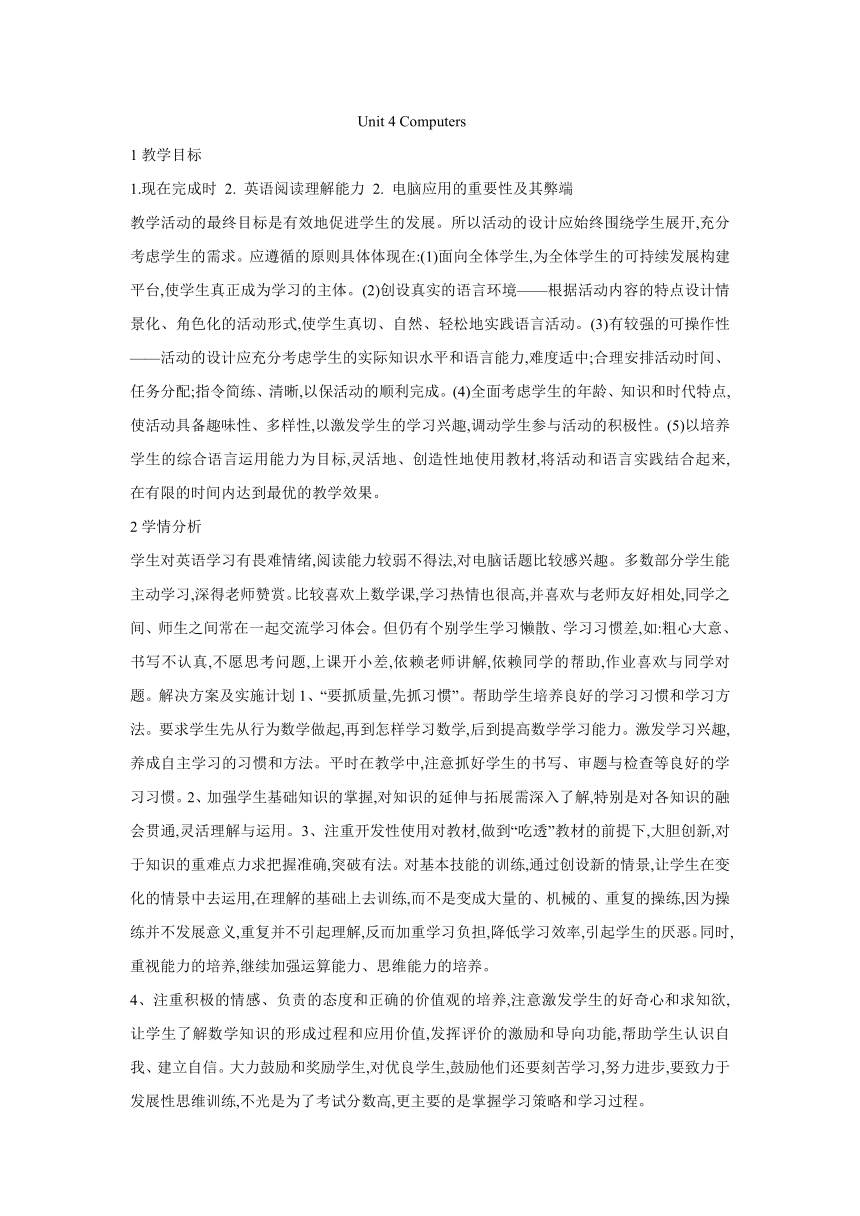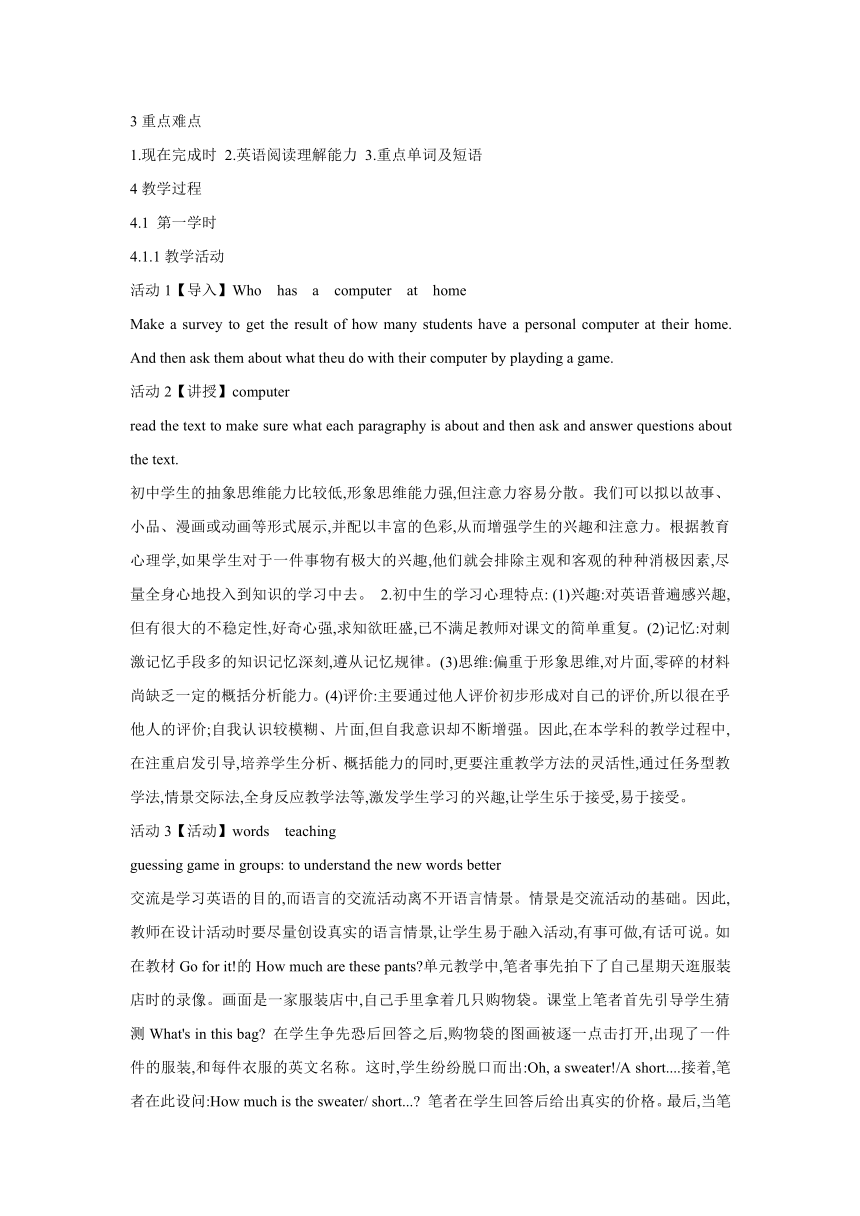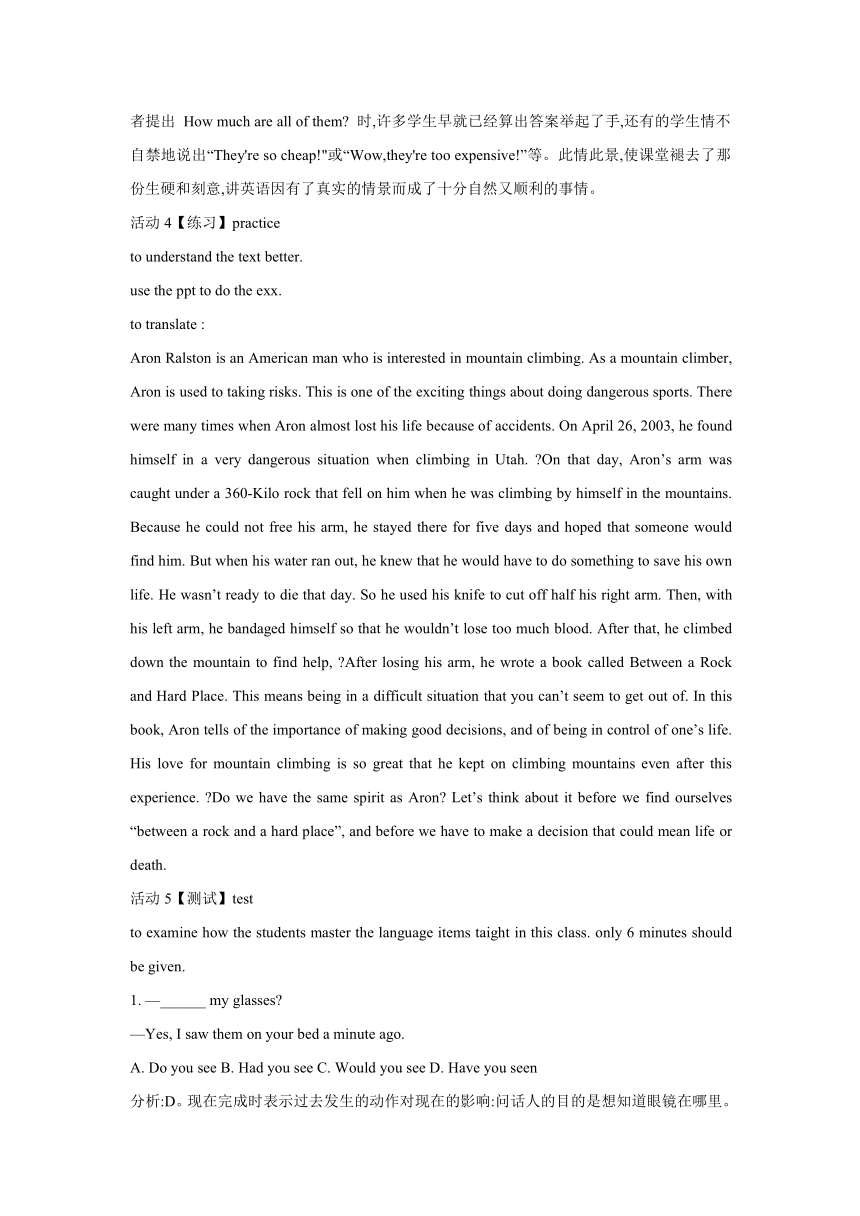Module 2 Unit 4 Computers.教学设计
文档属性
| 名称 | Module 2 Unit 4 Computers.教学设计 |

|
|
| 格式 | zip | ||
| 文件大小 | 124.5KB | ||
| 资源类型 | 教案 | ||
| 版本资源 | 牛津上海版(试用本) | ||
| 科目 | 英语 | ||
| 更新时间 | 2017-09-17 20:22:08 | ||
图片预览



文档简介
Unit
4
Computers
1教学目标
1.现在完成时
2.
英语阅读理解能力
2.
电脑应用的重要性及其弊端
教学活动的最终目标是有效地促进学生的发展。所以活动的设计应始终围绕学生展开,充分考虑学生的需求。应遵循的原则具体体现在:(1)面向全体学生,为全体学生的可持续发展构建平台,使学生真正成为学习的主体。(2)创设真实的语言环境——根据活动内容的特点设计情景化、角色化的活动形式,使学生真切、自然、轻松地实践语言活动。(3)有较强的可操作性——活动的设计应充分考虑学生的实际知识水平和语言能力,难度适中;合理安排活动时间、任务分配;指令简练、清晰,以保活动的顺利完成。(4)全面考虑学生的年龄、知识和时代特点,使活动具备趣味性、多样性,以激发学生的学习兴趣,调动学生参与活动的积极性。(5)以培养学生的综合语言运用能力为目标,灵活地、创造性地使用教材,将活动和语言实践结合起来,在有限的时间内达到最优的教学效果。
2学情分析
学生对英语学习有畏难情绪,阅读能力较弱不得法,对电脑话题比较感兴趣。多数部分学生能主动学习,深得老师赞赏。比较喜欢上数学课,学习热情也很高,并喜欢与老师友好相处,同学之间、师生之间常在一起交流学习体会。但仍有个别学生学习懒散、学习习惯差,如:粗心大意、书写不认真,不愿思考问题,上课开小差,依赖老师讲解,依赖同学的帮助,作业喜欢与同学对题。解决方案及实施计划1、“要抓质量,先抓习惯”。帮助学生培养良好的学习习惯和学习方法。要求学生先从行为数学做起,再到怎样学习数学,后到提高数学学习能力。激发学习兴趣,养成自主学习的习惯和方法。平时在教学中,注意抓好学生的书写、审题与检查等良好的学习习惯。2、加强学生基础知识的掌握,对知识的延伸与拓展需深入了解,特别是对各知识的融会贯通,灵活理解与运用。3、注重开发性使用对教材,做到“吃透”教材的前提下,大胆创新,对于知识的重难点力求把握准确,突破有法。对基本技能的训练,通过创设新的情景,让学生在变化的情景中去运用,在理解的基础上去训练,而不是变成大量的、机械的、重复的操练,因为操练并不发展意义,重复并不引起理解,反而加重学习负担,降低学习效率,引起学生的厌恶。同时,重视能力的培养,继续加强运算能力、思维能力的培养。
4、注重积极的情感、负责的态度和正确的价值观的培养,注意激发学生的好奇心和求知欲,让学生了解数学知识的形成过程和应用价值,发挥评价的激励和导向功能,帮助学生认识自我、建立自信。大力鼓励和奖励学生,对优良学生,鼓励他们还要刻苦学习,努力进步,要致力于发展性思维训练,不光是为了考试分数高,更主要的是掌握学习策略和学习过程。
3重点难点
1.现在完成时
2.英语阅读理解能力
3.重点单词及短语
4教学过程
4.1
第一学时
4.1.1教学活动
活动1【导入】Who has a computer at home
Make
a
survey
to
get
the
result
of
how
many
students
have
a
personal
computer
at
their
home.
And
then
ask
them
about
what
theu
do
with
their
computer
by
playding
a
game.
活动2【讲授】computer
read
the
text
to
make
sure
what
each
paragraphy
is
about
and
then
ask
and
answer
questions
about
the
text.
初中学生的抽象思维能力比较低,形象思维能力强,但注意力容易分散。我们可以拟以故事、小品、漫画或动画等形式展示,并配以丰富的色彩,从而增强学生的兴趣和注意力。根据教育心理学,如果学生对于一件事物有极大的兴趣,他们就会排除主观和客观的种种消极因素,尽量全身心地投入到知识的学习中去。
2.初中生的学习心理特点:
(1)兴趣:对英语普遍感兴趣,但有很大的不稳定性,好奇心强,求知欲旺盛,已不满足教师对课文的简单重复。(2)记忆:对刺激记忆手段多的知识记忆深刻,遵从记忆规律。(3)思维:偏重于形象思维,对片面,零碎的材料尚缺乏一定的概括分析能力。(4)评价:主要通过他人评价初步形成对自己的评价,所以很在乎他人的评价;自我认识较模糊、片面,但自我意识却不断增强。因此,在本学科的教学过程中,在注重启发引导,培养学生分析、概括能力的同时,更要注重教学方法的灵活性,通过任务型教学法,情景交际法,全身反应教学法等,激发学生学习的兴趣,让学生乐于接受,易于接受。
活动3【活动】words teaching
guessing
game
in
groups:
to
understand
the
new
words
better
交流是学习英语的目的,而语言的交流活动离不开语言情景。情景是交流活动的基础。因此,教师在设计活动时要尽量创设真实的语言情景,让学生易于融入活动,有事可做,有话可说。如在教材Go
for
it!的How
much
are
these
pants 单元教学中,笔者事先拍下了自己星期天逛服装店时的录像。画面是一家服装店中,自己手里拿着几只购物袋。课堂上笔者首先引导学生猜测What's
in
this
bag
在学生争先恐后回答之后,购物袋的图画被逐一点击打开,出现了一件件的服装,和每件衣服的英文名称。这时,学生纷纷脱口而出:Oh,
a
sweater!/A
short....接着,笔者在此设问:How
much
is
the
sweater/
short...
笔者在学生回答后给出真实的价格。最后,当笔者提出
How
much
are
all
of
them
时,许多学生早就已经算出答案举起了手,还有的学生情不自禁地说出“They're
so
cheap!"或“Wow,they're
too
expensive!”等。此情此景,使课堂褪去了那份生硬和刻意,讲英语因有了真实的情景而成了十分自然又顺利的事情。
活动4【练习】practice
to
understand
the
text
better.
use
the
ppt
to
do
the
exx.
to
translate
:
Aron
Ralston
is
an
American
man
who
is
interested
in
mountain
climbing.
As
a
mountain
climber,
Aron
is
used
to
taking
risks.
This
is
one
of
the
exciting
things
about
doing
dangerous
sports.
There
were
many
times
when
Aron
almost
lost
his
life
because
of
accidents.
On
April
26,
2003,
he
found
himself
in
a
very
dangerous
situation
when
climbing
in
Utah.
On
that
day,
Aron’s
arm
was
caught
under
a
360-Kilo
rock
that
fell
on
him
when
he
was
climbing
by
himself
in
the
mountains.
Because
he
could
not
free
his
arm,
he
stayed
there
for
five
days
and
hoped
that
someone
would
find
him.
But
when
his
water
ran
out,
he
knew
that
he
would
have
to
do
something
to
save
his
own
life.
He
wasn’t
ready
to
die
that
day.
So
he
used
his
knife
to
cut
off
half
his
right
arm.
Then,
with
his
left
arm,
he
bandaged
himself
so
that
he
wouldn’t
lose
too
much
blood.
After
that,
he
climbed
down
the
mountain
to
find
help,
After
losing
his
arm,
he
wrote
a
book
called
Between
a
Rock
and
Hard
Place.
This
means
being
in
a
difficult
situation
that
you
can’t
seem
to
get
out
of.
In
this
book,
Aron
tells
of
the
importance
of
making
good
decisions,
and
of
being
in
control
of
one’s
life.
His
love
for
mountain
climbing
is
so
great
that
he
kept
on
climbing
mountains
even
after
this
experience.
Do
we
have
the
same
spirit
as
Aron
Let’s
think
about
it
before
we
find
ourselves
“between
a
rock
and
a
hard
place”,
and
before
we
have
to
make
a
decision
that
could
mean
life
or
death.
活动5【测试】test
to
examine
how
the
students
master
the
language
items
taight
in
this
class.
only
6
minutes
should
be
given.
1.
—______
my
glasses
—Yes,
I
saw
them
on
your
bed
a
minute
ago.
A.
Do
you
see
B.
Had
you
see
C.
Would
you
see
D.
Have
you
seen
分析:D。现在完成时表示过去发生的动作对现在的影响:问话人的目的是想知道眼镜在哪里。又如:
—Have
you
waited
long
你等了很久吗
—No,
I
just
arrived
five
minutes
ago.
没等多久,我刚到五分钟。
2.
I
wonder
why
Jenny
______
us
recently.
We
should
have
heard
from
her
by
now.
A.
hasn’t
written
B.
doesn’t
write
C.
won’t
write
D.
hadn’t
written
分析:A。由
recently
和
by
now
可知用现在完成时。又如:
I’ve
been
on
rather
too
many
planes
and
trains
recently.
近来我乘飞机和火车次数太多了。
We
haven’t
seen
enough
of
Ray
and
Barbara
recently.
近来,
我们没怎么看见雷和巴巴拉。
3.
John
and
I
______
friends
for
eight
years.
We
first
got
to
know
each
other
at
a
Christmas
party.
But
we
______
each
other
a
couple
of
times
before
that.
A.
had
been;
has
seen
B.
have
been;
have
seen
C.
had
been;
had
seen
D.
have
been;
had
seen
分析:D。到目前为止成为朋友八年,用现在完成时;
在那次晚会相识成为朋友之前已经见过几次面,用过去完成时。又如:
I
have
had
this
car
for
ten
years.
这辆车我已经买了十年了。
I
haven’t
seen
Tom
for
two
years.
我已经有两年没见到汤姆了。
I’ve
lived
in
Central
London
for
six
years
now,
so
I’m
used
to
the
noise.
到目前为止,我已在伦敦中区住了6年,已经习惯于那里的喧闹声了。
4.
—How
long
______
David
and
Vicky
______
married
—For
about
four
years.
A.
were;
being
B.
have;
got
C.
have;
been
D.
did;
get
分析:C。由
For
about
four
years
可知,要用现在完成时,排除
A
和
D;
与时间段连用,不可用
get
married,
要用
be
married。又如:
I’ve
worn
glasses
for
ten
years.
我戴眼镜已经十年了。
The
Kenways
have
lived
here
for
five
years.
肯威家在这儿已经住了5年了。
5.
How
can
you
possibly
miss
the
news
It
______
on
TV
all
day
long.
A.
has
been
B.
had
been
C.
was
D.
will
be
分析:A。信息句为一般现在时,根据后句中all
day
long判断,这显然是强调播放新闻对现在的影响,故选现在完成时。又如:
We
have
waited
all
day.
我们等了整整一天了。
I
haven’t
seen
her
all
day.
我一整天都没看见她。
I’ve
had
a
headache
all
day.
我整天都感到头痛。
6.
She
has
set
a
new
record,
that
is,
the
sales
of
her
latest
book______50
million.
A.
have
reached
B.
has
reached
C.
are
reaching
D.
had
reached
分析:A。因为that
is意为“换句话说,即
(=in
other
words,
which
means)”,而前句中的谓语has
set是现在完成时,后一句的谓语动词也应用现在完成时,排除C和D;
又因主语the
sales是复数,选出正确答案A。
7.
The
first
use
of
atomic
weapons
was
in
1945,
and
their
power
______
increased
enormously
ever
since.
A.
is
B.
was
C.
has
been
D.
had
been
分析:C。因为ever
since的意思是“从那时(1945年)起一直到现在”,表示从过去某一时刻起一直延续到现在的动作或状态,要用现在完成时,现在完成时由“have
/has+过去分词”构成,所以选C。
8.
Years
ago
we
didn’t
know
this,
but
recent
science
______
that
people
who
don’t
sleep
well
soon
get
ill.
A.
showed
B.
has
shown
C.
will
show
D.
is
showing
分析:B。由表示对照的Years
ago和recent可知,“以前不知”,但“现在已经证明了”,所以用现在完成时。
9.
The
coffee
is
wonderful!
It
doesn’t
taste
like
anything
I
______
before.
A.
was
having
B.
have
C.
have
ever
had
D.
had
ever
had
分析:C。与before连用,用现在完成时。再说,此处没有一个过去时间或动作比较,是不能用过去完成时的。
10.
My
brother
is
an
actor.
He
______in
several
film
so
far.
A.
appears
B.
appeared
C.
has
appeared
D.
is
appearing
分析:C。因so
far(到目前为止)通常与现在完成时连用。
11.
The
country
life
he
was
used
to
______
greatly
since
1992.
A.
change
B.
has
changed
C.
changing
D.
have
changed
分析:B。since
1992这类时间状语通常与现在完成时连用。主句主语是the
country
life,句中he
was
used
to是省略了关系代词that的定语从句。
12.
Although
medical
science
______
control
over
several
dangerous
diseases,
what
worries
us
is
that
some
of
them
are
returning.
A.
achieved
B.
has
achieved
C.
will
achieve
D.
had
achieved
分析:B。用现在完成时表示结果或对现在的影响。又如:The
streets
have
been
swept
free
of
leaves.
街上的落叶已打扫干净。
13.
—
______
leave
at
the
end
of
this
month.
—
I
don’t
think
you
should
do
that
until
______
another
job.
A.
I’m
going
to;
you’d
found
B.
I’m
going
to;
you’ve
found
C.
I’ll;
you’ll
find
D.
I’ll;
you’d
find
分析:B。第一空用be
going
to表示打算或意图,第二空用现在完成时暗示对方应该“先找到新工作,然后再辞职”。注:第二空若不用现在完成时,用一般现在时也可以。
14.
This
machine
______.
It
hasn’t
worked
for
years.
A.
didn’t
work
B.
wasn’t
working
C.
doesn’t
work
D.
isn’t
working
分析:C。此处讲的是机器目前的状况,故用一般现在时。此题所利用的干扰时态是其后的现在完成时。
15.
My
friend,
who
______
on
the
International
Olympic
Committee
all
his
life,
is
retiring
next
month.
(www.)
A.
served
B.
is
serving
C.
had
served
D.
has
served
分析:D。由于是下个月将要退休,说明现在还在职,据此可排除A和C;
再根据句中的all
his
life可知要用现在完成时。
16.
I
______
in
London
for
many
years,
but
I’ve
never
regretted
my
final
decision
to
move
back
to
China.
A.
lived
B.
was
living
C.
have
lived
D.
had
lived
分析:A。许多同学一看到后面的have
never
regretted为现在完成时,同时选项C也是现在完成时,结果滥用时态呼应,将答案误选C。其实,此题的最佳答案是A。句中but后的句子告诉我们,说话者现在已搬回了上海,所以他住在伦敦应属于过去的事情,故应用一般过去时。
17.
We
______
our
new
neighbors
yet,
so
we
don’t
know
their
names.
A.
don’t
meet
B.
won’t
meet
C.
haven’t
met
D.
hadn’t
met
分析:C。后文我们还不知道邻居的名字,这说明我们还没有见面,故用现在完成时。
18.
Danny
______
hard
for
long
to
realize
his
dream
and
now
he
is
popular.
A.
works
B.
is
working
C.
has
worked
D.
worked
分析:C。表示从过去一直待续到现在的一段时间,要用现在完成时。
19.
We
live
day
by
day,
but
in
the
great
things,
the
time
of
days
and
weeks
______
so
small
that
a
day
is
unimportant.
A.
is
B.
are
C.
has
been
D.
have
been
分析:A。句子主语为the
time,故用谓语要用单数;
再根据句子前后的时态live和is,可知此处宜用一般现在时,不用现在完成时,故选A。
20.
—
______
you
______
him
around
the
museum
yet
—
Yes.
We
had
a
great
time
there.
A.
Have;
shown
B.
Do;
show
C.
Had;
shown
D.
Did;
show
分析:A。根据问句中的yet可知,所谈论的事情发生在最近的过去,且问话者很关心这个过去发生的事情对现在的影响和结果,所以用现在完成时。注意:不要受答语中过去式谓语had的影响而误选C。
活动6【作业】homework
1.
readaloud
and
try
to
recite
important
parts
ot
the
text.
2.
finish
the
exx
on
P33.
4
Computers
1教学目标
1.现在完成时
2.
英语阅读理解能力
2.
电脑应用的重要性及其弊端
教学活动的最终目标是有效地促进学生的发展。所以活动的设计应始终围绕学生展开,充分考虑学生的需求。应遵循的原则具体体现在:(1)面向全体学生,为全体学生的可持续发展构建平台,使学生真正成为学习的主体。(2)创设真实的语言环境——根据活动内容的特点设计情景化、角色化的活动形式,使学生真切、自然、轻松地实践语言活动。(3)有较强的可操作性——活动的设计应充分考虑学生的实际知识水平和语言能力,难度适中;合理安排活动时间、任务分配;指令简练、清晰,以保活动的顺利完成。(4)全面考虑学生的年龄、知识和时代特点,使活动具备趣味性、多样性,以激发学生的学习兴趣,调动学生参与活动的积极性。(5)以培养学生的综合语言运用能力为目标,灵活地、创造性地使用教材,将活动和语言实践结合起来,在有限的时间内达到最优的教学效果。
2学情分析
学生对英语学习有畏难情绪,阅读能力较弱不得法,对电脑话题比较感兴趣。多数部分学生能主动学习,深得老师赞赏。比较喜欢上数学课,学习热情也很高,并喜欢与老师友好相处,同学之间、师生之间常在一起交流学习体会。但仍有个别学生学习懒散、学习习惯差,如:粗心大意、书写不认真,不愿思考问题,上课开小差,依赖老师讲解,依赖同学的帮助,作业喜欢与同学对题。解决方案及实施计划1、“要抓质量,先抓习惯”。帮助学生培养良好的学习习惯和学习方法。要求学生先从行为数学做起,再到怎样学习数学,后到提高数学学习能力。激发学习兴趣,养成自主学习的习惯和方法。平时在教学中,注意抓好学生的书写、审题与检查等良好的学习习惯。2、加强学生基础知识的掌握,对知识的延伸与拓展需深入了解,特别是对各知识的融会贯通,灵活理解与运用。3、注重开发性使用对教材,做到“吃透”教材的前提下,大胆创新,对于知识的重难点力求把握准确,突破有法。对基本技能的训练,通过创设新的情景,让学生在变化的情景中去运用,在理解的基础上去训练,而不是变成大量的、机械的、重复的操练,因为操练并不发展意义,重复并不引起理解,反而加重学习负担,降低学习效率,引起学生的厌恶。同时,重视能力的培养,继续加强运算能力、思维能力的培养。
4、注重积极的情感、负责的态度和正确的价值观的培养,注意激发学生的好奇心和求知欲,让学生了解数学知识的形成过程和应用价值,发挥评价的激励和导向功能,帮助学生认识自我、建立自信。大力鼓励和奖励学生,对优良学生,鼓励他们还要刻苦学习,努力进步,要致力于发展性思维训练,不光是为了考试分数高,更主要的是掌握学习策略和学习过程。
3重点难点
1.现在完成时
2.英语阅读理解能力
3.重点单词及短语
4教学过程
4.1
第一学时
4.1.1教学活动
活动1【导入】Who has a computer at home
Make
a
survey
to
get
the
result
of
how
many
students
have
a
personal
computer
at
their
home.
And
then
ask
them
about
what
theu
do
with
their
computer
by
playding
a
game.
活动2【讲授】computer
read
the
text
to
make
sure
what
each
paragraphy
is
about
and
then
ask
and
answer
questions
about
the
text.
初中学生的抽象思维能力比较低,形象思维能力强,但注意力容易分散。我们可以拟以故事、小品、漫画或动画等形式展示,并配以丰富的色彩,从而增强学生的兴趣和注意力。根据教育心理学,如果学生对于一件事物有极大的兴趣,他们就会排除主观和客观的种种消极因素,尽量全身心地投入到知识的学习中去。
2.初中生的学习心理特点:
(1)兴趣:对英语普遍感兴趣,但有很大的不稳定性,好奇心强,求知欲旺盛,已不满足教师对课文的简单重复。(2)记忆:对刺激记忆手段多的知识记忆深刻,遵从记忆规律。(3)思维:偏重于形象思维,对片面,零碎的材料尚缺乏一定的概括分析能力。(4)评价:主要通过他人评价初步形成对自己的评价,所以很在乎他人的评价;自我认识较模糊、片面,但自我意识却不断增强。因此,在本学科的教学过程中,在注重启发引导,培养学生分析、概括能力的同时,更要注重教学方法的灵活性,通过任务型教学法,情景交际法,全身反应教学法等,激发学生学习的兴趣,让学生乐于接受,易于接受。
活动3【活动】words teaching
guessing
game
in
groups:
to
understand
the
new
words
better
交流是学习英语的目的,而语言的交流活动离不开语言情景。情景是交流活动的基础。因此,教师在设计活动时要尽量创设真实的语言情景,让学生易于融入活动,有事可做,有话可说。如在教材Go
for
it!的How
much
are
these
pants 单元教学中,笔者事先拍下了自己星期天逛服装店时的录像。画面是一家服装店中,自己手里拿着几只购物袋。课堂上笔者首先引导学生猜测What's
in
this
bag
在学生争先恐后回答之后,购物袋的图画被逐一点击打开,出现了一件件的服装,和每件衣服的英文名称。这时,学生纷纷脱口而出:Oh,
a
sweater!/A
short....接着,笔者在此设问:How
much
is
the
sweater/
short...
笔者在学生回答后给出真实的价格。最后,当笔者提出
How
much
are
all
of
them
时,许多学生早就已经算出答案举起了手,还有的学生情不自禁地说出“They're
so
cheap!"或“Wow,they're
too
expensive!”等。此情此景,使课堂褪去了那份生硬和刻意,讲英语因有了真实的情景而成了十分自然又顺利的事情。
活动4【练习】practice
to
understand
the
text
better.
use
the
ppt
to
do
the
exx.
to
translate
:
Aron
Ralston
is
an
American
man
who
is
interested
in
mountain
climbing.
As
a
mountain
climber,
Aron
is
used
to
taking
risks.
This
is
one
of
the
exciting
things
about
doing
dangerous
sports.
There
were
many
times
when
Aron
almost
lost
his
life
because
of
accidents.
On
April
26,
2003,
he
found
himself
in
a
very
dangerous
situation
when
climbing
in
Utah.
On
that
day,
Aron’s
arm
was
caught
under
a
360-Kilo
rock
that
fell
on
him
when
he
was
climbing
by
himself
in
the
mountains.
Because
he
could
not
free
his
arm,
he
stayed
there
for
five
days
and
hoped
that
someone
would
find
him.
But
when
his
water
ran
out,
he
knew
that
he
would
have
to
do
something
to
save
his
own
life.
He
wasn’t
ready
to
die
that
day.
So
he
used
his
knife
to
cut
off
half
his
right
arm.
Then,
with
his
left
arm,
he
bandaged
himself
so
that
he
wouldn’t
lose
too
much
blood.
After
that,
he
climbed
down
the
mountain
to
find
help,
After
losing
his
arm,
he
wrote
a
book
called
Between
a
Rock
and
Hard
Place.
This
means
being
in
a
difficult
situation
that
you
can’t
seem
to
get
out
of.
In
this
book,
Aron
tells
of
the
importance
of
making
good
decisions,
and
of
being
in
control
of
one’s
life.
His
love
for
mountain
climbing
is
so
great
that
he
kept
on
climbing
mountains
even
after
this
experience.
Do
we
have
the
same
spirit
as
Aron
Let’s
think
about
it
before
we
find
ourselves
“between
a
rock
and
a
hard
place”,
and
before
we
have
to
make
a
decision
that
could
mean
life
or
death.
活动5【测试】test
to
examine
how
the
students
master
the
language
items
taight
in
this
class.
only
6
minutes
should
be
given.
1.
—______
my
glasses
—Yes,
I
saw
them
on
your
bed
a
minute
ago.
A.
Do
you
see
B.
Had
you
see
C.
Would
you
see
D.
Have
you
seen
分析:D。现在完成时表示过去发生的动作对现在的影响:问话人的目的是想知道眼镜在哪里。又如:
—Have
you
waited
long
你等了很久吗
—No,
I
just
arrived
five
minutes
ago.
没等多久,我刚到五分钟。
2.
I
wonder
why
Jenny
______
us
recently.
We
should
have
heard
from
her
by
now.
A.
hasn’t
written
B.
doesn’t
write
C.
won’t
write
D.
hadn’t
written
分析:A。由
recently
和
by
now
可知用现在完成时。又如:
I’ve
been
on
rather
too
many
planes
and
trains
recently.
近来我乘飞机和火车次数太多了。
We
haven’t
seen
enough
of
Ray
and
Barbara
recently.
近来,
我们没怎么看见雷和巴巴拉。
3.
John
and
I
______
friends
for
eight
years.
We
first
got
to
know
each
other
at
a
Christmas
party.
But
we
______
each
other
a
couple
of
times
before
that.
A.
had
been;
has
seen
B.
have
been;
have
seen
C.
had
been;
had
seen
D.
have
been;
had
seen
分析:D。到目前为止成为朋友八年,用现在完成时;
在那次晚会相识成为朋友之前已经见过几次面,用过去完成时。又如:
I
have
had
this
car
for
ten
years.
这辆车我已经买了十年了。
I
haven’t
seen
Tom
for
two
years.
我已经有两年没见到汤姆了。
I’ve
lived
in
Central
London
for
six
years
now,
so
I’m
used
to
the
noise.
到目前为止,我已在伦敦中区住了6年,已经习惯于那里的喧闹声了。
4.
—How
long
______
David
and
Vicky
______
married
—For
about
four
years.
A.
were;
being
B.
have;
got
C.
have;
been
D.
did;
get
分析:C。由
For
about
four
years
可知,要用现在完成时,排除
A
和
D;
与时间段连用,不可用
get
married,
要用
be
married。又如:
I’ve
worn
glasses
for
ten
years.
我戴眼镜已经十年了。
The
Kenways
have
lived
here
for
five
years.
肯威家在这儿已经住了5年了。
5.
How
can
you
possibly
miss
the
news
It
______
on
TV
all
day
long.
A.
has
been
B.
had
been
C.
was
D.
will
be
分析:A。信息句为一般现在时,根据后句中all
day
long判断,这显然是强调播放新闻对现在的影响,故选现在完成时。又如:
We
have
waited
all
day.
我们等了整整一天了。
I
haven’t
seen
her
all
day.
我一整天都没看见她。
I’ve
had
a
headache
all
day.
我整天都感到头痛。
6.
She
has
set
a
new
record,
that
is,
the
sales
of
her
latest
book______50
million.
A.
have
reached
B.
has
reached
C.
are
reaching
D.
had
reached
分析:A。因为that
is意为“换句话说,即
(=in
other
words,
which
means)”,而前句中的谓语has
set是现在完成时,后一句的谓语动词也应用现在完成时,排除C和D;
又因主语the
sales是复数,选出正确答案A。
7.
The
first
use
of
atomic
weapons
was
in
1945,
and
their
power
______
increased
enormously
ever
since.
A.
is
B.
was
C.
has
been
D.
had
been
分析:C。因为ever
since的意思是“从那时(1945年)起一直到现在”,表示从过去某一时刻起一直延续到现在的动作或状态,要用现在完成时,现在完成时由“have
/has+过去分词”构成,所以选C。
8.
Years
ago
we
didn’t
know
this,
but
recent
science
______
that
people
who
don’t
sleep
well
soon
get
ill.
A.
showed
B.
has
shown
C.
will
show
D.
is
showing
分析:B。由表示对照的Years
ago和recent可知,“以前不知”,但“现在已经证明了”,所以用现在完成时。
9.
The
coffee
is
wonderful!
It
doesn’t
taste
like
anything
I
______
before.
A.
was
having
B.
have
C.
have
ever
had
D.
had
ever
had
分析:C。与before连用,用现在完成时。再说,此处没有一个过去时间或动作比较,是不能用过去完成时的。
10.
My
brother
is
an
actor.
He
______in
several
film
so
far.
A.
appears
B.
appeared
C.
has
appeared
D.
is
appearing
分析:C。因so
far(到目前为止)通常与现在完成时连用。
11.
The
country
life
he
was
used
to
______
greatly
since
1992.
A.
change
B.
has
changed
C.
changing
D.
have
changed
分析:B。since
1992这类时间状语通常与现在完成时连用。主句主语是the
country
life,句中he
was
used
to是省略了关系代词that的定语从句。
12.
Although
medical
science
______
control
over
several
dangerous
diseases,
what
worries
us
is
that
some
of
them
are
returning.
A.
achieved
B.
has
achieved
C.
will
achieve
D.
had
achieved
分析:B。用现在完成时表示结果或对现在的影响。又如:The
streets
have
been
swept
free
of
leaves.
街上的落叶已打扫干净。
13.
—
______
leave
at
the
end
of
this
month.
—
I
don’t
think
you
should
do
that
until
______
another
job.
A.
I’m
going
to;
you’d
found
B.
I’m
going
to;
you’ve
found
C.
I’ll;
you’ll
find
D.
I’ll;
you’d
find
分析:B。第一空用be
going
to表示打算或意图,第二空用现在完成时暗示对方应该“先找到新工作,然后再辞职”。注:第二空若不用现在完成时,用一般现在时也可以。
14.
This
machine
______.
It
hasn’t
worked
for
years.
A.
didn’t
work
B.
wasn’t
working
C.
doesn’t
work
D.
isn’t
working
分析:C。此处讲的是机器目前的状况,故用一般现在时。此题所利用的干扰时态是其后的现在完成时。
15.
My
friend,
who
______
on
the
International
Olympic
Committee
all
his
life,
is
retiring
next
month.
(www.)
A.
served
B.
is
serving
C.
had
served
D.
has
served
分析:D。由于是下个月将要退休,说明现在还在职,据此可排除A和C;
再根据句中的all
his
life可知要用现在完成时。
16.
I
______
in
London
for
many
years,
but
I’ve
never
regretted
my
final
decision
to
move
back
to
China.
A.
lived
B.
was
living
C.
have
lived
D.
had
lived
分析:A。许多同学一看到后面的have
never
regretted为现在完成时,同时选项C也是现在完成时,结果滥用时态呼应,将答案误选C。其实,此题的最佳答案是A。句中but后的句子告诉我们,说话者现在已搬回了上海,所以他住在伦敦应属于过去的事情,故应用一般过去时。
17.
We
______
our
new
neighbors
yet,
so
we
don’t
know
their
names.
A.
don’t
meet
B.
won’t
meet
C.
haven’t
met
D.
hadn’t
met
分析:C。后文我们还不知道邻居的名字,这说明我们还没有见面,故用现在完成时。
18.
Danny
______
hard
for
long
to
realize
his
dream
and
now
he
is
popular.
A.
works
B.
is
working
C.
has
worked
D.
worked
分析:C。表示从过去一直待续到现在的一段时间,要用现在完成时。
19.
We
live
day
by
day,
but
in
the
great
things,
the
time
of
days
and
weeks
______
so
small
that
a
day
is
unimportant.
A.
is
B.
are
C.
has
been
D.
have
been
分析:A。句子主语为the
time,故用谓语要用单数;
再根据句子前后的时态live和is,可知此处宜用一般现在时,不用现在完成时,故选A。
20.
—
______
you
______
him
around
the
museum
yet
—
Yes.
We
had
a
great
time
there.
A.
Have;
shown
B.
Do;
show
C.
Had;
shown
D.
Did;
show
分析:A。根据问句中的yet可知,所谈论的事情发生在最近的过去,且问话者很关心这个过去发生的事情对现在的影响和结果,所以用现在完成时。注意:不要受答语中过去式谓语had的影响而误选C。
活动6【作业】homework
1.
readaloud
and
try
to
recite
important
parts
ot
the
text.
2.
finish
the
exx
on
P33.
